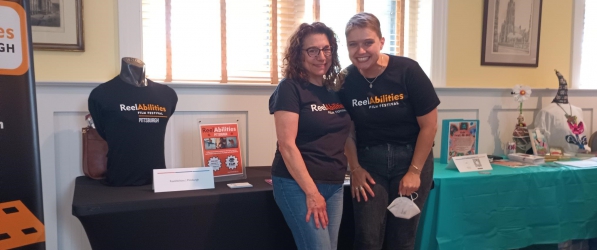
Hello! My name is Alison Mahoney and I am going into my fourth year of the PhD program in Theatre and Performance Studies at Pitt, where my doctoral research focuses on performance and disability. I decided to pause my career in non-profit arts administration to pursue graduate study because I believe that academic work in the humanities can and should meaningfully inform cultural non-profits. My long-term career goals bring together these two worlds, so I was excited to learn about the Humanities Engage program and the opportunities it provides for students to apply their academic work to the broader community.
This summer, I am excited to be working as a Humanities Engage immersive fellow with Film Pittsburgh, focusing on their ReelAbilities Festival. The ReelAbilities Festival is an international festival with locations in New York, Los Angeles, Toronto, Mexico City, and beyond that promotes awareness and appreciation of the lives, stories, and artistic expressions of disabled communities. Before starting my PhD at Pitt, I spent several years working for non-profit performing arts organizations in New York City, where I built a career advocating for accessible arts practices for disabled artists and audiences. I worked on the Accessibility team at Lincoln Center for the Performing Arts, where we presented several ReelAbilities films and post-screening events each year. When I moved to Pittsburgh, I was excited to learn that Film Pittsburgh has hosted a ReelAbilities festival annually since 2013.
This past fall, I had the opportunity to integrate ReelAbilities into the syllabus for the class I taught, an undergraduate seminar in Theatre Arts called Disability and Performance on the Global Stage. I required my students to attend one in-person and one virtual ReelAbilities screenings and to reflect on their experiences attending an accessible cultural event focused on disability. Film Pittsburgh generously offered discounted tickets to my students and coordinated with me to choose the most appropriate films for my course goals. This brief partnership was mutually beneficial: Film Pittsburgh was eager to engage a college-aged audience, and I was able to use the festival as an example not only of disability film but of accessible programming for disabled audiences. Many of my students found this to be the most exciting unit of our class, as many of them had never been to an event with so many disabled audience members whose access was prioritized in highly visible ways. ReelAbilities served as a fantastic example that we returned to throughout the semester when considering accessible programming for disabled audiences and provided a launching point to our discussions about disability representation in film.
One of my tasks this summer will be to coordinate more of these kinds of relationships between academic institutions around Pittsburgh and the ReelAbilities Festival. As universities offer more and more courses that focus on disability, I believe ReelAbilities can provide an exciting link between undergraduate curriculum and the broader Pittsburgh disability community. I will also be working closely with Film Pittsburgh’s newly formed ReelAbilities Advisory Committee, which includes disabled Pittsburghers, service providers, and academics. This committee’s mandate is to explore how they might reshape festival programming, structure, and community outreach to increase attendance and be more responsive to the disability community’s needs. I’m excited to see how the festival evolves to consider these constituents more deeply in their decision making processes.
My ethnographic research into international disability arts practices highlights exciting initiatives like those at ReelAbilities to integrate accessibility creatively within arts spaces and to deeply involve the disability community in arts programming. Currently, much non-profit work that engages disabled audiences does so through an approach oriented to compliance with the Americans with Disabilities Act (ADA). More often than not, this results in rigid and uninspired access initiatives that fails to consider the disability community as partners with dynamic needs beyond just wheelchair-accessible restrooms and ramps (though these are extremely important too!). Within this model, accommodations like audio description for blind audience members are offered as individual add-ons to performances, rather than being meaningfully integrated into the artwork’s aesthetics. Upon completing my PhD at Pitt, I hope to bring this humanities-informed thinking to cultural non-profits working with disabled artists to encourage a more holistic understanding of access work. Working in an administrative capacity with Film Pittsburgh this summer will help me build outreach, marketing, and programming skills that I hope to carry into future research, both within and outside of the academy. With dedicated support from Humanities Engage and mentorship from Film Pittsburgh’s skilled administrative staff, I look forward to building strong foundations from which to collaborate with disabled communities.
